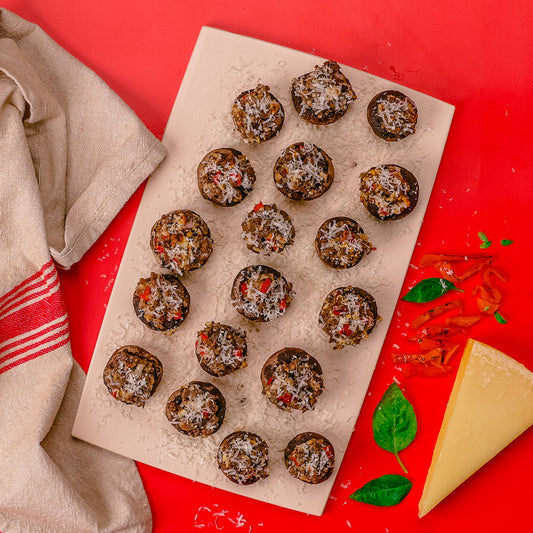
4 Demonized Foods That Are Actually Good for You
Amongst diets like the Mediterranean, Keto, and Whole30, plant-based eating has recently become a popular lifestyle choice for many people. Although we love plants and know the importance of including them in our daily diets, we also know the significance of having a variety of other foods. These foods include some demonized foods, like beef, full-fat dairy, salt, and whole eggs. Over the years, these four foods have earned a bad reputation. We are here to explain that you should not fear these foods!
Demonized Food #1: Beef
Common Myth: Eating red meat is bad for you.
The quality of red meat determines whether or not it’s bad for you.

As a beef brand, we often hear consumers say they no longer eat red meat because it’s terrible for their health. However, it’s the quality of the red meat that matters most. When it comes to eating red meat, it’s critical to consider the quality of your beef. Unfortunately, people tend to overlook quality. The quality of your beef determines which health benefits (or health detriments) show up in your overall health. This is why all of our beef is grass-fed, grass-finished, and sourced straight from Australia, New Zealand, and parts of the U.S., where nutrient-rich grasses grow year-round. When it comes to quality and taste, elements like climate, region, and soil matter, which is why we instinctively consider these factors, so you don’t have to.
Shopping Tip: When choosing red meat, always go for quality. Choose the highest quality, unprocessed varieties. Think meats like steak, ground beef, and roasts instead of the more processed selections with additives, like processed lunch meats.
Demonized Food #2: Full Fat Dairy
Common Myth: Don’t eat full-fat dairy, it’s too high in fat. Select low-fat dairy instead.
Full-fat dairy isn’t bad for you, but low-fat dairy that is laden with sugar can be.
For decades, we have been led to believe fat will make you fat, but recently fat’s reputation has been restored. (Can we get an amen!) As it turns out, sugar is the culprit for unwanted weight gain and a host of other health woes. Although low-fat foods don’t contain fat, that also means they don’t contain much flavor. (Fat = flavor). Since most of the fat has been omitted from low-fat foods, and subsequently the flavor, flavor needs to be added back in somehow, and more often than not, the taste is added back into foods in the form of sugar. Instead of reaching for that low-fat yogurt, go ahead and go for the full-fat.
Shopping Tip: If you are purchasing full-fat dairy foods, it’s still important to thoroughly read nutrition labels and review the ingredients. When it comes to full-fat dairy, be sure you are investing in foods that contain the right kinds of fats.
Demonized Food #3: Salt
Common Myth: Salt is bad for you.
Salt is not inherently bad for you, but too much salt can be.

Salt (sodium chloride) is essential for optimal health. Our bodies need a small amount of salt to function properly, as sodium plays a vital role in our health. Sodium helps the body maintain fluid balances, works to transmit nerve impulses, helps individuals who experience low blood pressure, and influences the contraction and relaxation of muscles. Individuals who follow a diet full of whole foods and cook most of their meals at home usually fall within the healthy limits of sodium intake. Many people get off track when it comes to refined, processed convenience foods that rely heavily on salt for flavor and preservation. Make sure you are paying attention to food labels and minimizing your consumption of processed foods, oh and don’t be afraid to utter the phrase, “Please pass the salt” at the dinner table. You need some salt in your daily diet, after all.
We talked to our friends at Real Salt and Jenny summed it up perfectly saying,
“There’s been a myth and a misconception that salt is bad for you and rightfully so because the salt in the wrong form can be. Sea salt can be just sodium chloride and stripped of its minerals. So, people are absolutely right. In the wrong form, it can be a bad thing. At Real Salt, we nurture those minerals and understand that that is the reason we leave salt in its pure natural form because we need the magnesium, the calcium, and potassium to really ingest sodium the way that is intended in our bodies.”
Tip: Look for unrefined salt when grocery shopping. Just like beef, the source of your salt reflects the quality. Redmond's real salt is a great option because it is sold in its pure form, no refining needed.
Demonized Food #4: Whole Eggs
Common Myth: Eating the whole egg, including the egg yolk, will give you high cholesterol.
Egg yolks contain cholesterol, but they also host other important nutrients.

For years, eggs have been demonized for their higher cholesterol content. The high cholesterwl content is found in the yolk of the egg. (Hello egg white omelets). Unfortunately, cholesterol is the leading cause of heart disease. What so often gets ignored are the other nutrients that eggs contain, some of which actually help to lower the risk of heart disease. Just like with beef, the sourcing of your eggs is of the utmost importance. As with red meat, you are not only what you eat, but what your food eats as well. When it comes to purchasing eggs, go for the high-quality pasture-raised eggs. It’s worth the extra investment!
Red meat, full-fat dairy, salt, and whole eggs should not be feared! They are actually good for you, so set aside any food fears and fill your plate (in moderation) with these four foods.
Be sure to follow and tag us on social media @eatpre_ so we can see how you enjoy eating these four foods!
Interested in learning more about why Pre provides the best beef from grass fed cattle? Here are some more resources you can check out!
- The Big Fat Truth About Pasture Raising Cattle
- Grass Fed vs. Organic
- Best Way to Cook Steak in the Oven
- What are sub-therapeutic antibiotics?
- How to Cook Steak on Grill


